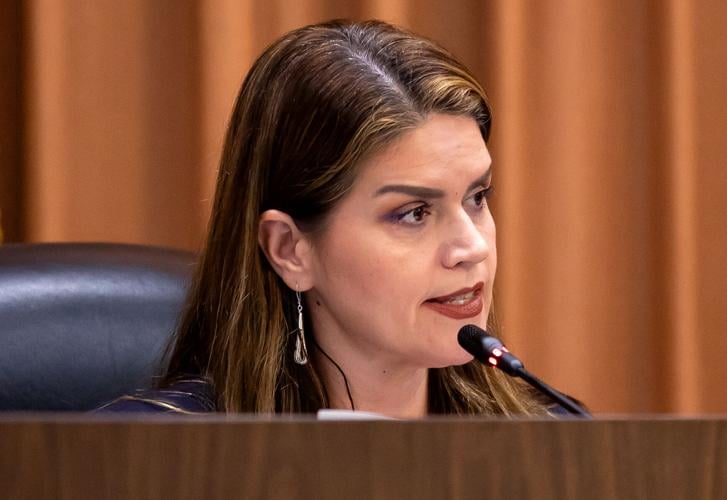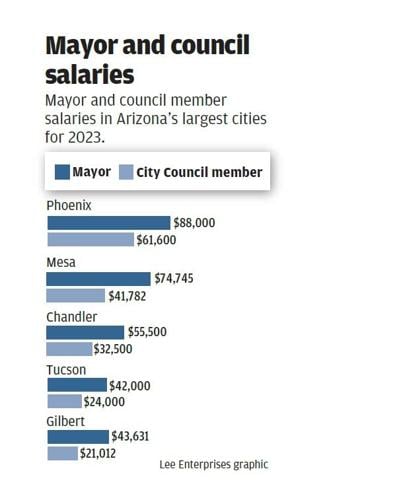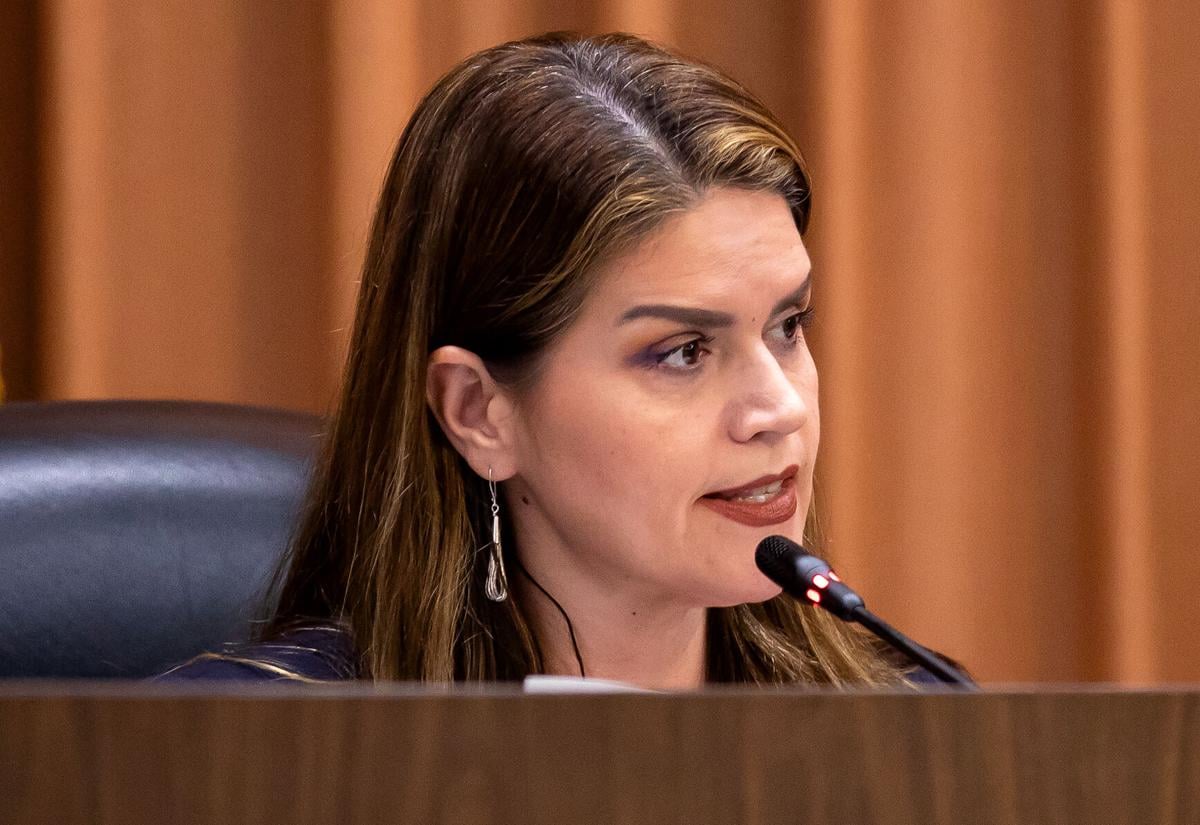Tucson’s voters will yet again decide whether the mayor and City Council members will receive a raise — a proposition the city’s electorate has turned down since 1999.
But this year’s measure to increase the electees’ salaries, Proposition 413, proposes the highest pay raise to date by giving the mayor and council members a nearly 130% and 220% boost, respectively.
In 1999, Tucson’s mayor was given a salary of $42,000, while council members’ pay was set at $24,000. The salaries lag Tucson’s median household income of $48,058, according to U.S. Census data. For council members, a 40-hour work week would divvy their pay out to $11.54 per hour, $2.31 less than the current minimum wage.
If approved, Prop 413 would raise the mayor’s salary to $95,750 and council members’ yearly pay to $76,600. The ballot measure ties Tucson’s elected officials’ annual income to the earnings of the Pima County Board of Supervisors, which earns salaries set by state statute.
While council members’ salaries would match supervisors’ pay, the mayor would make 1.25 times a county supervisor’s salary. The extra costs would be “absorbed by the budget” and “will not negatively affect City services,” according to a report from the Citizens’ Commission on Public Service and Compensation, which makes recommendations on the public officials’ salaries.
If passed, the raises in Prop 413 would go into effect on Dec. 4, but the change would mean the city’s salaries would be tethered to the state statute governing supervisors’ pay, which means supervisors and City Council members would make $96,600 beginning in 2024 while the mayor would earn more than $120,000.
Many council members report relying on part-time gigs or retirement savings to make ends meet while working their full-time, public-facing jobs. Advocates for the proposition say the pay raise is long overdue, but dissenters say the measure goes too far.
The city established a seven-member volunteer Citizens’ Commission on Public Service and Compensation in 1993. The group’s members were appointed by City Manager Michael Ortega and met seven times to come up with this year’s proposed raises while considering economic data, past elections and public input.
Now, voters are set to decide a measure that would put Tucson’s mayor and council among the highest-paid elected city leaders in the state.

Tucson lags behind the five most populous Arizona cities in mayor and council salaries.
Laura Dent, a member of the commission that made the recommendations behind Prop 413, said one of the biggest reasons to increase council members’ salaries is to attract a more diverse pool of candidates.
“The fact that we have really low wages for public servants creates a structural barrier for everyday people to lead and serve, and I really believe if we knock down those barriers, there are greater opportunities for working folks, for single moms, for students, for folks that are more reflective of the community to serve in this role,” she said.
Mayor Regina Romero, who works part-time doing consulting work on top of pulling 70-hour work weeks as mayor, echoed this sentiment.
“I believe that the low pay for elected positions that carry so much responsibility, and so much work, are a vestige of systems that really were created to keep out diverse communities from participating civically in their democracy as elected representatives,” she said. “We’ve got to be able to make it possible for a single mom of two to serve as a council member or as mayor.”
Ward 1 Council Member Lane Santa Cruz said, “I try to encourage people, especially younger people, all the time about considering running for office,” but the No. 1 deterrent is pay.
In addition to their full-time council position, Santa Cruz spends their evenings and weekends doing part-time contracting work while taking care of four kids.
If Prop 413 passes, “It would make me less stressed financially,” they said. “I’m stuck renting, I don’t have a steady income that I could even be on a pathway to purchase a home. So, I think it would create a space where I can make plans and have financial stability.”
The probability of the measure passing is clouded by historical rejection from the city’s constituents. In 2021, a ballot measure to raise the salaries for the mayor and council members by $12,000 lost by a nearly 1% margin.
But council members say the job deserves much more pay than it earns.
“For the future of the city, I really hope that folks decide to pay mayor and council a salary that is commensurate with their experience and the value that they bring to the table and to the city,” said Ward 4 Council Member Nikki Lee, who works full-time for The Arbinger Institute outside City Council.
Are the figures too high?
While most of the members of the commission that proposed the salaries in Prop 413 agreed mayor and council are long overdue for a raise, one member dissented on the final decision.
Agustin Urquidi said he was supportive of a previous discussion to raise council member’s salaries to $56,000 and the mayor’s to $70,000, but “right before the final meeting there was a proposal submitted by one of the members that called for a more ambitious raise, which is what ended up passing, but I didn’t agree with it,” he said.
The proposed pay would make Tucson’s electees the highest paid out of Arizona’s five largest cities, topping Phoenix’s mayor and council members’ pay of $88,000 and $61,600, respectively.
“That would make the mayor and council pay above what is typical for a city at that size,” Urquidi said. Phoenix’s population is about 1.6 million, while Tucson’s is about 550,000, according to Census data.
But Dent said, “it felt right to tie the compensation of local leaders to that reference point” of what the county’s supervisors make. While the supervisors control a $1.8 billion budget, the city’s budget is $2.2 billion this fiscal year.
Several groups have endorsed Prop 413 — including the Pima County Democratic Party, the Tucson Firefighters Association and the Tucson Metro Chamber — but the Pima County Republican Party has launched a rebuttal to the initiative, arguing mayor and council don’t deserve the pay bump.
“We have a city where our quality of life is diminishing daily. We have our crime rate gaining monthly. And we’re gonna reward this activist crew with a massive pay increase?” said Dave Smith, chairman of the Pima County Republican Party.
Ward 3 Council Member Kevin Dahl said voters’ decisions on Prop 413 “shouldn’t be based on what you think of current (council members) because we’re doing this for the future.”
“We limit the pool of applicants by keeping this less than minimum wage salary,” said Dahl, who relies on retirement savings to support himself beyond his council salary.
Steve Kozachik, Ward 6 council member, also relies on retirement savings from his previous role at the University of Arizona. However, he said the proposed salaries are “just a bad look.”
“We’re trying to frame a salary in a manner that makes these landing pads for people from a career standpoint. There’s some element of public service in this, and that’s built into the definition of the position,” he said. “We all know what we’re getting into when we sign up for it. So my concern is it’s too much, too soon.”
Kozachik also worries the raises would add stress to the city’s already overburdened pension obligations.
Ward 2 Council Member Paul Cunningham said in a text, “I think the council could be more effective if it was able to work full time. Because I potentially would gain personally from the measure passing, I don’t feel it’s appropriate to advocate any more than that.”
“The salary of the Mayor and Council positions for the City of Tucson has not changed in 23 years, nearly a quarter century,” Ward 5 Council Member Richard Fimbres said in an emailed statement. “The duties have increased and the charter needs to reflect on both for the future of Tucson and our community.”
The majority of mayor and council think the pay raise would attract more diverse future talent to the positions while working full time on the biggest issues facing Tucson.
“Why do we act surprised when we have never had a woman in the history of the city of Tucson be the mayor, or Latina, much less?” Romero said of the mayors who took office before her. “I’m not independently wealthy … but I think (council pay) was done purposely to perpetuate only the wealthy few to be able to serve.”
Get your morning recap of today's local news and read the full stories here: tucne.ws/morning






